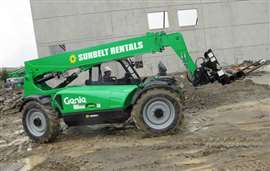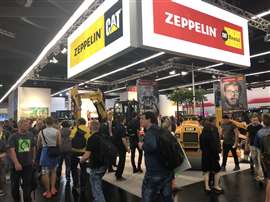Are we finally entering the age of the global equipment rental business?
02 June 2023
Equipment rental has been growing inexorably for several decades. On both side of the Atlantic and in Asia there are single businesses with annual revenues exceeding billions of dollars.
But despite this scale – US company United Rentals is the largest at US$9.5 billion – there has not yet emerged a genuinely global, generalist rental business.
 Ashtead Group owns Sunbelt Rentals, which operates in US, Canada and the UK. (Photo: Sunbelt Rentals)
Ashtead Group owns Sunbelt Rentals, which operates in US, Canada and the UK. (Photo: Sunbelt Rentals)
There are some global renters in specialist sectors, such as Aggreko in power and Toi Toi-Dixi in portable sanitation, but the generalists – those that rent a wide range of construction and industrial equipment – are still largely rooted in their home country or region.
This is made clear by the latest IRN100 survey of the world’s largest equipment rental companies, published each year by International Rental News (IRN).
Why is this still the case, when in so many sectors of construction there are genuine global players, in contracting, building materials and construction equipment?
“You are starting to see the biggest rental companies investing internationally”, says Murray Pollok, managing editor of International Rental News and lead author of the survey, “but it tends to be piecemeal and relatively small scale.
“United Rentals has a fledgling business in Europe and recently acquired operations in Australia. Ashtead has its massive US business Sunbelt Rentals, and a market leader sister company in the UK, but is absent elsewhere. With both companies it is the US and Canada where the main action is.”
The key thing, said Pollok, is that rental companies continue to see the greatest opportunities in their home country or region. Sunbelt Rentals is adding dozens of depots to its US operations each year, and all of the major US businesses are making domestic acquisitions alongside organic growth.
“In Europe”, says Pollok, “the biggest players, such as Boels Rental, Loxam and Kiloutou, continue to consolidate the European market and are more interested in building scale where they already operate or moving into new markets within Europe.
“You see the same process in Asia, where Japan’s big four renters – Aktio, Kanamoto, Nikken and Nishio Rent-All – are expanding into South East Asia, Australia and – to a lesser extent – China.”
It is simply too early in rental’s development for truly global businesses to emerge, despite it being something like a US$100 billion market worldwide.
Fragmented or consolidated?
The IRN100 survey highlights the degree of consolidation of the market: the top 15 North American companies represent around 50% of the US market, and the top five are closer to 42%. The largest 15 European companies have a share of more than 50%, and the top five take around 31% of the total in Europe.
Considered globally, the IRN100 companies represent around 65% of the total market, and the top five just short of a quarter. There is clearly scope for a higher degree of consolidation.
 Zeppelin Rental is owned by German Caterpillar dealer Zeppelin Group. (Photo: Zeppelin)
Zeppelin Rental is owned by German Caterpillar dealer Zeppelin Group. (Photo: Zeppelin)
“It’s difficult to predict when rental will become a genuine global market”, says Pollok, “It depends on how quickly the regional players exhaust their domestic opportunities.
“Some of the larger businesses may simply be waiting for others to do the hard work of consolidation before making their move.”
Pollok also points out that there are some businesses operating ‘de facto’ global rental operations. For example, the vast majority of Caterpillar’s distributors operate rental businesses, often under the Cat Rental Store brand.
Indeed, a remarkable 16 of the 100 companies in the IRN100 are Cat dealers, including companies like Canada-based Finning, Zeppelin in Germany, TESYA in Spain and Italy, and Sime Darby in Asia. These businesses are run separately and focused on their Cat territories, which limits their scope to expand geographically, but some, like Zeppelin, have been very successful in creating large rental businesses.
There is now a definite trend for equipment OEMs to get more directly involved in rental, with Hitachi investing heavily and CNH Industrial, owner of Case Construction, now going down that route.
For the time being, though, it is the pure rental companies who are making the running. Who will be the first global rental business? Most would place their bets on United Rentals or Ashtead, but in business there is always room for surprises.
The IRN100 survey is in the June issue of International Rental News. Click here to download the survey.
STAY CONNECTED



Receive the information you need when you need it through our world-leading magazines, newsletters and daily briefings.
CONNECT WITH THE TEAM








